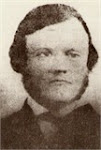The owners of railroads operating in Wisconsin were struggling to stay in operation in the wake of the Panic of 1857. One railroad's misery was a stock manipulator's dream - or perhaps a nightmare. Rapid consolidation was underway that would leaveWisconsin with two railroads - Milwaukee & St. Paul Railway and the Chicago & North Western - operating all trackage in the state (excepting 86 miles operated by very small roads).
The Milwaukee & St. Paul Railway managed a major growth spurt when it swallowed whole the Milwaukee & Prairie du Chien Company. The Milwaukee & Prairie du Chien Company was an association of bondholders organized to acquire and operate the bankrupt Milwaukee & Mississippi Railroad.
In 1850, the Milwaukee & Mississippi RR had built and operated the first track in the state between Milwaukee and Elm Grove via Wauwatosa. See Wisconsin Railroad Timeline and The Railroads of Wisconsin, 1827-1937, Railway and Locomotive Historical Society (1937).
In brief, the Wall Street brokerage firm Henry Stimson & Company (with others) quietly bought up all common stock shares of Milwaukee & Prairie du Chien Company (i.e. they cornered the market). They then called in short sales. When the short selling brokers tried to buy shares to cover their position they found that shares were only available at stupendously inflated prices (the stock's share price rose from $64.50 to $230 in ten days). Short selling involves selling shares one does not own on the premise that the shares will be cheaper by the time one actually has to deliver the shares. In other words, you are betting the stock will go down - the more the better.
The 'corner' succeeded marvelously. Stimson & Company now owned a dominant position Milwaukee & Prairie du Chien Company. Life isn't always fair, but sometimes it is not only fair but also wildly hilarious. The Milwaukee & Prairie du Chien Company's charter denied any say in the company's management to common stock holders until a $2,556,000 mortgage was repaid. Stimson & Company found itself unable to control the company it owned lock-stock-and-barrel.
Stimson, et al., didn't get to be successful stock manipulators by giving up at the first roadblock. They devised a clever plan - in a duplicitous sort of way - to fleece the rubes after all. Stimson knew that the Wisconsin legislature had issued the charter under which the Milwaukee & Prairie du Chien Company operated and therefore could amend it. They seemingly blundered by openly seeking the introduction of an amendment to give votes to the common stockholders. The bill was quickly exposed and rejected. At the same time, however, another bill was insinuated onto the legislative docket that appeared to deal only with a corrupt petroleum company (Merk at page 229). I reality, the bill granted voting rights to Stimson's common stock. It passed in an end of session rush of legislative activity (some things never change).
My primary source is Frederick Merk's indispensable Economic History of Wisconsin During the Civil War Decade published by the State Historical Society in 1916. You can download Merk's book free at Google Books.
The following excerpt from a private research site concerning the history of the Milwaukee Road details how the deal worked:
In New York, the brokerage firm of Henry Stimson & Company began overt speculation in Milwaukee & Prairie du Chien stock. The brokerage had quietly purchased all available common stock of the railroad, and had loaned these shares to various persons and businesses, subject to a short call. In early November. 1865, the brokers suddenly called in all of the stock. The New York Stock Exchange was besieged by traders attempting to purchase shares to satisfy the short call. Milwaukee & Prairie du Chien stock skyrocketed, and the Stimson traders were able to sell their remaining shares at these high prices. The New York Times remarked that the corner was "the sharpest and beyond all precedent the most sudden corner known to the forty years' history of the New York Stock Exchange." Prairie du Chien being French for prairie dog, the corner was memorialized as the "Prairie Dog Corner." Tremendous profits flowed to the speculators.
It would happen often with the Milwaukee Road.
The New York speculators retained a majority of the common shares of the Milwaukee & Prairie du Chien stock, but they were surprised to learn that this was non-voting stock according to an unusual provision of the railroad's charter. An agent of the brokerage managed to slip a provision into a last minute legislative measure -- ostensibly designed to regulate petroleum companies in Wisconsin -- but which converted the non-voting common stock of the railroad to voting stock: the speculators now had control of the company, which they offered to the Milwaukee & St. Paul, which accepted, trading share for share.
















No comments:
Post a Comment